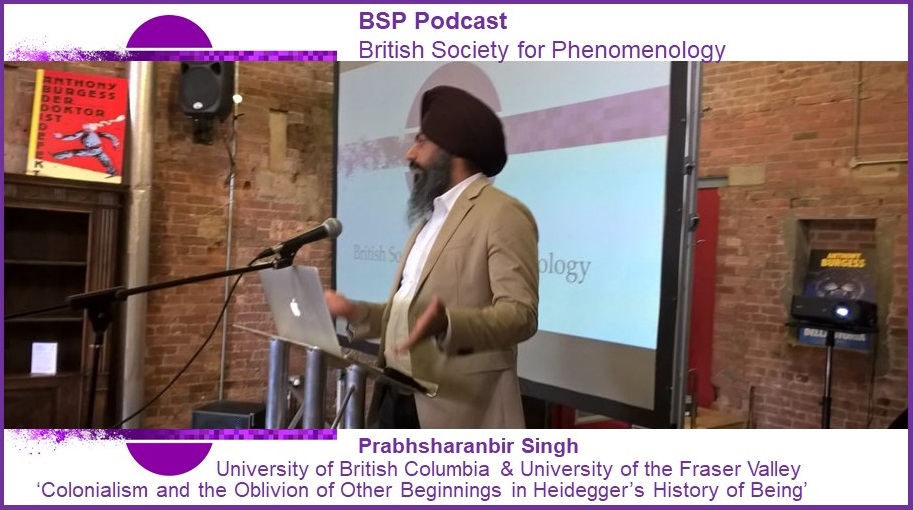Season 4 of our podcast continues with the final episode taken from our journal’s 50th Anniversary Conference in summer 2019.
Season 4 episode 77: 12 June 2020
Here is the final of our recordings from the JBSP 50th Anniversary Conference: On the History of Being – After the Black Notebooks (2019) which was held in celebration of fifty years of the Journal of the British Society for Phenomenology. The paper comes from Prabhsharanbir Singh (University of British Columbia & University of the Fraser Valley).
Prabhsharanbir Singh: The Auseinandersetzung with Colonialism and the Oblivion of Other Beginnings in Heidegger’s History of Being
You can listen to this episode on the BSP’s Podbean site, and you can also find it on iTunes and all good podcasting apps by searching ‘BSP Podcast’.
ABSTRACT: “Dear Bill,” Edward Said once said to William Spanos, “you’re a good critic, but why do you weaken your originative criticism by Heideggerianizing it?” And Spanos responded, “Edward, I think you’re a good critic, too, but why do you limit possibilities by not attending to Heidegger’s destructive ontology?” This exchange shows that an Auseinandersetzung between Heidegger’s thinking and colonialism is still waiting to happen. This paper will be a modest step toward such confrontation. Auseinandersetzung as an onto-poetic confrontation with the other is not reducible to mere conflict. It is an originary strife with roots in Heraclitus’ thinking of polemos, the source for the origin of “history”. Colonialism, understood in Heideggerian terms, is a progressive ‘darkening of the earth’ by modern technology. The essence of this technology is Enframing, which converts everything that exists into standing-reserve, a resource waiting to be exploited. The conversion of Eastern spiritualities into New Age mysticism is one example of this process. Heidegger understood the planetary domination of modern technology in the form of Western imperialism as an ontological event in the History of Being. Consequently, he also understood the futility of programmatic responses to such an event. Everything that is programmable remains within the realm of calculative reason, the driving force behind modern technology. Perhaps that is why, in his later writings, especially the Contributions and the Black Notebooks, Heidegger constructs a philosophical theology, which dwells upon the Other Beginning and the Last God. I argue that Heidegger’s philosophical-theological project failed because he was oblivious toward other beginnings, beginnings lying outside the pale of ‘Western Humankind,’ he was so (obsessively) concerned with. He writes in the Black Notebooks, “Our thinking does not need to be “international” or even European; but it must indeed be Western and metaphysical if it is to fathom more originarily the ground of our history out of the essence of beyng, i.e., out of the “between” of the encounter of gods and humans.” His insistence that the Other Beginning must arise from within the West is problematic. However, I do not believe that other cultures, cultures colonized by the West, have this Other Beginning, for it is not something that any culture can possess as a definite quality. But I do believe that this Other Beginning, in the aftermath of the colonial event, might lie somewhere in the encounter, in the interstices of the Auseinandersetzung with the non-Western Other that Heidegger, unfortunately, missed. My own being, as a post-colonial ‘subject,’ is a battleground between Sikh spirituality and the drive towards Enframing by modern technology. The other beginning, if it is possible at all, might emerge out of crevices that this strife has created. This paper is an attempt to initiate an Auseinandersetzung between Heidegger’s History of Being and the still unEnframed remnants of Sikh spirituality.

Journal of the British Society for Phenomenology: Special Issue – Heidegger and the Black Notebooks (Volume 51, Issue 2, 2020). Prabhsharanbir Singh’s paper, as well as others presented at JBSP 50th Anniversary Conference, has been reworked and published as an essay in this special edition.
The JBSP 50th Anniversary Conference: On the History of Being – After the Black Notebooks (2019) celebrated 50 years of the journal. The British Society for Phenomenology held a three-day conference at the International Anthony Burgess Foundation, Manchester, UK from 31 May to 2 June, 2019. The aim of the event was to examine the contribution of Heidegger’s Schwarze Hefte (Black Notebooks) to an understanding of the question of the history of being.
The British Society for Phenomenology is a not-for-profit organisation set up with the intention of promoting research and awareness in the field of Phenomenology and other cognate arms of philosophical thought. Currently, the society accomplishes these aims through its journal, events, and podcast. Why not find out more, join the society, and subscribe to our journal the JBSP?

